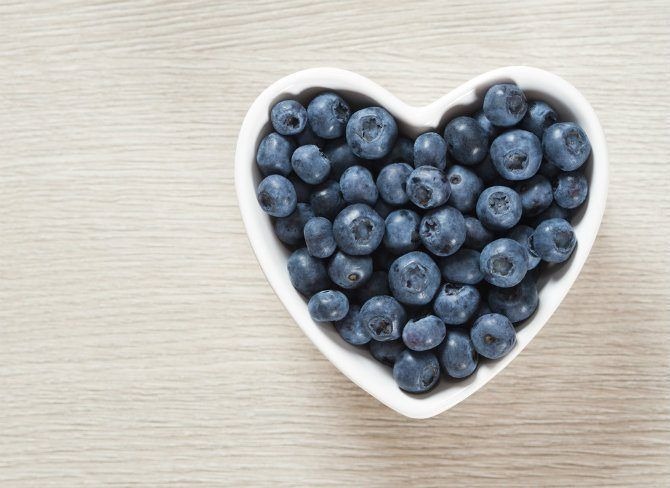5 Formidable (And Delicious) Foods To Fuel Your Heart
We may receive a commission on purchases made from links.
1. Blueberries:
Fresh blueberries are amazingly delicious and versatile. They can be eaten fresh or blended in smoothies, and they add a spectrum of flavor and textures to any number of desserts. They are also versatile enough to be a component of many savory dishes.
Among fruits and vegetables, blueberries are one of the most potent sources of antioxidants available. The regular consumption of blueberries is associated with a reduced risk of certain types of cancer, cardiovascular disease, Parkinson's disease, Alzheimer's dementia, diabetes, and many other illnesses. One serving (one cup) of blueberries contains 25 percent of the recommended daily amount of vitamin C. Blueberries also contain vitamin K, manganese, and are also a rich source of fiber, which is essential for the proper health of our gastrointestinal microbiome.
Blueberry Lemon Goat Cheese Tart
This recipe is a delicious way to reap the antioxidant benefits that come from blueberries. It is a luscious dessert that you can enjoy without the guilt!
2. Garlic:
Garlic and its relatives, onions and leeks, are frequent fixtures in many cuisines around the globe. The familiar odor and taste of garlic are deployed when it is crushed or chopped and the cell walls are broken, releasing the enzymatic activity of alliinase that catalyzes the formation of allicin. Allicin rapidly breaks down to form a variety of organosulfur compounds, which are thought to provide much of the health benefits of this plant. Since heat can inactivate alliinase, some people recommend letting garlic stand for ten minutes after chopping or crushing before cooking it.
The allicin found in garlic also increases the enzymatic activity of catalase and glutathione found in human cells. These enzymes perform important antioxidant functions. Garlic has well-known antimicrobial properties and is about one percent as effective an antibacterial as penicillin. Garlic has also been shown to reduce blood pressure and LDL ("bad") cholesterol. Eating parsley after eating garlic can help remove any offending garlic odor.
3. Salmon:
Wild salmon is an amazingly delicious and versatile fatty fish. Like many such fish, salmon is rich in omega-3s, which are essential polyunsaturated fatty acids. These compounds have shown potential anti-tumor activity. A diet rich in fish like salmon is associated with a decreased risk of heart attack, stroke, Parkinson's disease, and Alzheimer's disease. Regular consumption of foods like wild salmon are associated with a reduction in blood pressure, reduced atherosclerosis, and increased insulin sensitivity. A decreased sensitivity to insulin, or insulin resistance, is associated with the development of type II diabetes.
4. Duck:
Duck is often neglected when we're considering poultry options. However, when correctly prepared (duck unlike chicken, should never be cooked through, but should be served medium-rare to medium, with a warm pink center), it is a succulent and savory entrée. Duck is a great source of niacin and selenium, both of which are needed for good heart function. It provides more iron per serving than chicken, turkey, Cornish game hens, and even some cuts of beef. Duck fat, while containing some saturated fats, is also extremely rich in both monounsaturated and polyunsaturated fats; the same types of fats found in olive oil.
5. Tomatoes:
Now an indispensable kitchen staple for any number of cuisines and dishes, for many years the tomato was shunned because of its relationship to belladonna, the deadly nightshade. And while certainly a tantalizing temptress, there are few things more delicious than a fully ripe, sun-kissed tomato straight from the garden. Fortunately for us, tomatoes pack none of consequences of deadly nightshade.
In fact, tomatoes, especially those cooked with olive oil, are a rich source of the carotenoid lycopene. Because carotenoids are fat-soluble nutrients, maximum absorption is achieved when they are consumed with fat or fat rich foods, such as avocados and olive oil. Lycopenes have been shown to have significant activity against the development of prostate, breast, and lung cancer, as well as other gastrointestinal cancers, like stomach cancer. Lycopenes may also protect the heart against oxidative damage; a process that is believed to play a prominent role in the development of atherosclerosis and heart attacks. The regular consumption of tomatoes and the compounds contained within them have been shown to reduce blood pressure in patients with hypertension. However, many supermarket tomatoes are "ripened" with ethylene gas, which may make them appear ripe, sweet, and delicious but leave a suboptimal taste in your mouth with respect to both flavor and nutrition.
Dr. Mike is a cardiologist, chef, and author. He serves as America's Culinary Interventionist. His latest book, The Fallacy of the Calorie, is available on Amazon.com or at www.cardiochef.com.
